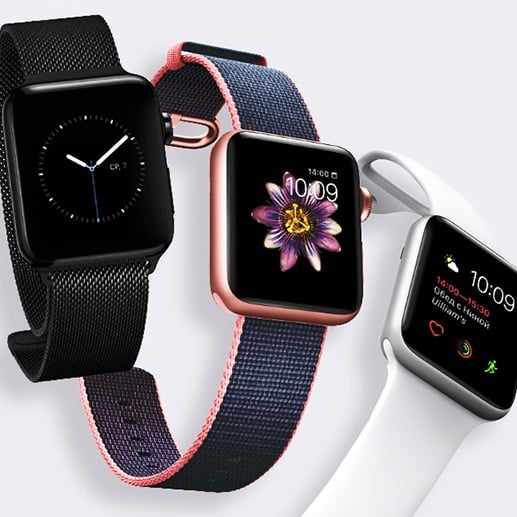Consumer Electronics
Apple Grabs Lead From Fitbit in Wearables Market

Published:
Last Updated:

The worldwide market for wearable devices like fitness trackers and smartwatches rose 10.3% in 2017. The industry shipped 115.4 million units last year, compared with 104.6 million units in 2016.
While double-digit growth is impressive, the year-over-year percentage is less than half the growth posted in 2016 compared with 2017. Slower growth typically favors the big dogs, and that’s just what happened last year. Apple Inc. (NASDAQ: AAPL) lifted its share of the wearables market from 10.8% in 2016 to 15.3%, while former top dog Fitbit Inc. (NYSE: FIT) saw its share dip from 21.5% to 13.3%.
The data were reported last week by tech industry analyst firm IDC. The research director for the firm’s wearables group, Ramon T. Llamas, commented:
The slowdown is not due to a lack of interest – far from it. Instead, we saw numerous vendors, relying on older models, exit the market altogether. At the same time, the remaining vendors – including multiple start-ups – have not only replaced them, but with devices, features, and services that have helped make wearables more integral in people’s lives.
Not only did Apple take the top spot for 2017 shipments, it also posted the most shipments in the fourth quarter, the first time the company has managed to displace Fitbit in quarterly sales. Apple shipped 8 million wearable devices in the fourth quarter compared to 5.4 million shipments from Fitbit. Xiaomi ranked third with 4.9 million units, and Garmin Ltd. (NASDAQ: GRMN) ranked fourth with 2.5 million units shipped.
Apple’s fourth-quarter market share totaled 21.0%, to 14.2% for Fitbit, 13.0% for Xiaomi and 6.5% for Garmin. For the full year, Apple led with a 15.3% share while Xiaomi ranked second with a 13.6% share, followed by Fitbit with 13.3%, Garmin with 5.4%, and Fossil Group Inc. (NASDAQ: FOSL) with a 4.3% share.
IDC’s Llamas added:
Interest in smartwatches continues to grow and Apple is well-positioned to capture demand. User tastes have become more sophisticated over the past several quarters and Apple pounced on the demand for cellular connectivity and streaming multimedia. What will bear close observation is how Apple will iterate upon these and how the competition chooses to keep pace.
Jitesh Ubrani, IDC senior research analyst for mobile device trackers said:
Although prices for individual products has slowly declined, consumer preferences have shifted to more sophisticated devices and towards well recognized brands. It’s due to this that the wearables market has seen healthy double-digit growth in average selling prices since 2016. Combined with the potential to sell added software and services, wearables are proving to be an increasingly lucrative market for brands and service providers.
“More sophisticated devices” and “well recognized brands” — when consumers think of those two terms as they relate to tech products, what is the first name that comes to mind?
Over the past two years, Apple’s stock price has risen by about 72%. Only Garmin, with a bump of about 50% has even stayed close. Fitbit’s stock is down about 57% and Fossil’s is down nearly 73% in the same two years. Investors, too, appear to be interested only in well-known companies that have a history of making sophisticated devices. Apple and Garmin fit the bill; Fitbit and Fossil, not so much.
Ever wanted an extra set of eyes on an investment you’re considering? Now you can speak with up to 3 financial experts in your area for FREE. By simply
clicking here you can begin to match with financial professionals who can help guide you through the financial decisions you’re making. And the best part? The first conversation with them is free.
Click here to match with up to 3 financial pros who would be excited to help you make financial decisions.
Thank you for reading! Have some feedback for us?
Contact the 24/7 Wall St. editorial team.